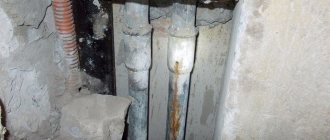Whose property are pipes and risers in apartment buildings?
The owner of the MKD heating system is determined by the legislation of the Russian Federation. According to the Rules (clause 1), approved by Government Decree No. 491 of August 13, 2006, heating, water supply and sewerage risers are classified as common property. Thus, they are the common property of all residents of the apartment building, which is transferred to the management of the management company.
Laws quite clearly regulate the rights and obligations of owners of common property. The fundamental documents are considered to be the Housing Code (Article 155) and the Civil Code (Article 290) of the Russian Federation.
Analyzing the legal side of the issue, we can conclude that the owners of individual apartments are not the owners of heating risers, even if they are located indoors.
Whose house is there a boner in?
There are several regulatory characteristics of the common property of apartment buildings:
- belongs to all apartment owners on the right of common ownership;
- is located in an apartment building inside or outside the premises or outside this apartment building;
- intended to serve more than one room in an apartment building.
The riser runs through several apartments in the entrance; therefore, it cannot be considered the personal property of any one owner. Additional confirmation: in the event of an accident, it is impossible to stop the supply of heat to only a single apartment - the entire riser is completely turned off. So, we found out: risers are part of the common property.
Who should change/repair them and when?
Maintenance of the heating system involves 2 types of repairs - current and major.
- The first type includes work to eliminate minor problems that do not require significant costs. They are carried out at the request of residents, as needed.
- Major repairs include general house-wide measures to ensure the operability and safety of the entire system. The procedure for its implementation is stipulated by Chapter 15 of the Housing Code of the Russian Federation. Replacing heating risers belongs to this type of repair. It is carried out according to a schedule, taking into account regulatory deadlines, in the event of an emergency or to modernize the system.
The management company is responsible for carrying out planned capital and current repairs. She, of course, does not conduct it herself, but with the involvement of a specialized organization. Unscheduled events of this type are carried out by decision of the general meeting of residents. Next, the application is submitted to the management company, which ensures their implementation.
Read more about the types and costs of major and other types of repairs of heating systems in an apartment building here.
Who is responsible for the repair and replacement of common property?
Now let’s figure out who is responsible for the risers in an apartment building. Let's turn again to the Housing Code. It states that the management company (MC) is responsible for ensuring high-quality maintenance of common property . This leads to the conclusion: according to the law, replacing risers in an apartment building, as well as repairing them, is the direct responsibility of the management company. And who should change the batteries in a privatized apartment, read here.
At the same time, the management company must perform its functions in such a way that the condition of the common property at any time ensures the uninterrupted provision of high-quality utility services. An old, rusty riser pipe is an indicator of a clearly low level of work on the maintenance of common property. Find out what the responsibilities of the management company are in the article https://realtyinfo.online/6180-osnovnye-obyazannosti-polnomochiya-uk-soglasno-zakonodatelstvu.
How long is the service life of thermal communications according to GOST?
The arrangement of the heating system in the apartment building is carried out taking into account the requirements of GOST 32415-2013. Its risers can be made of different materials, but must ensure high reliability and durability. Any material has a certain service life, when the performance of pipes made from it is guaranteed. Based on this indicator, a schedule is drawn up for the overhaul of the central heating system of the apartment building.
This parameter is set by the Departmental Construction Standards (VSN). For heating risers made of ferrous metal, according to VSN 58-88, the guaranteed service life is 20 years (Appendix 2 of VSN). When using galvanized pipes, it can increase to 25 years. In real life, major repairs are carried out every 25-30 years.
Legal advice. Who should repair pipes in a house?
Anatoly Pavlovich SHEVCHENKO, lawyer of the Chunsky branch of the Irkutsk Regional Bar Association (IOKA), answers readers’ questions.
I live in an apartment building on the fourth floor, where for several days now the neighbors below have been coming to me with complaints because a wet spot has formed on the ceiling in the toilet near the pipe. They complain to me that I am to blame for the flooding of their apartment. I invited my neighbors to my apartment and invited them to find the source of the leak. The neighbors crawled around on their knees, but found nothing, but still accused me of causing damage to them. Their argument is the same - water cannot flow up, but only down. They called a plumber and he couldn’t find anything, but he suggested that the pipe between the ceilings might have rotted and suggested that I punch a hole between the apartments. I am against it because I recently renovated the toilet and bathroom. What to do in this situation, who should repair these pipes and at whose expense will all this repair be?
Troubles such as pipe leaks in the apartments of an apartment building are not very uncommon and you should not take the reproaches of your neighbors downstairs with hostility, because living in such buildings, no one is immune from a similar situation. Put yourself in the place of your neighbors, and if water drips on your head, especially after expensive repairs, I think that you will also go with claims to them. So put yourself in the position of the injured party and try to eliminate the water leak with the least possible losses.
It should be taken into account that the service life of the engineering systems of an apartment building is 25 years, and most five-story panel buildings were built in the last century, therefore the engineering systems have long required major repairs.
However, the need to install new pipes may arise not only due to some kind of emergency, but also, for example, due to renovations in an apartment, when the owners want to get rid of outdated elements and install modern ones. Let's figure out who is responsible for what.
Engineering communications serving more than one room in an apartment building are common property. These, in particular, include risers for hot and cold water supply and sewerage. According to the Rules for the maintenance of common property in an apartment building (approved by Decree of the Government of the Russian Federation No. 491 of August 13, 2006), the owners have the right to independently carry out actions for the maintenance and repair of common property or involve other persons in this, taking into account the chosen method of managing the apartment building.
Taishet24 news on Viber!
All our houses are serviced by management companies (in accordance with Part 2.3 of Article 161 of the Housing Code of the Russian Federation). With this method of managing an apartment building, the management organization is responsible to the homeowners for providing all services and performing work that ensure the proper maintenance of the common property.
The rules for maintaining common property in an apartment building state that the responsibility of the management company ends at the section of pipe where the first drain valve from the riser is located.
The water supply riser valve is also part of the common property of an apartment building. This is stated in the Rules for the maintenance of common property, approved by Resolution No. 491 (where the valve is designated as a shut-off device), therefore the management company must also repair it at the expense of a monthly fee for the maintenance and repair of housing.
Next comes the site, which belongs only to the owners of a particular apartment, which means they are responsible for its operation and maintenance in working and safe condition. If something breaks in this zone, then the owner of the premises is obliged to eliminate the defects that have arisen at his own expense, since in accordance with Article 210 of the Civil Code of the Russian Federation, it is the owner who bears the burden of maintaining the property belonging to him, unless otherwise provided by law or contract.
It’s a completely different question if you need to repair or replace risers, which are vertical pipes passing through all apartments from the basement to the fifth floor, and this is a common property that is managed by the management company. Be aware that major repairs are carried out using additional funds - this can be money from the capital construction fund of a regional operator or from an account opened specifically for your home. If you transfer money for major repairs to a regional fund, you will have to wait for the repair period planned by the regional program for your home.
However, let’s return to your problem and if something happened to the communal pipes, for example, they started leaking, then you need to contact the management company immediately. But, as practice shows, utility workers are not always willing to make contact and, at the first call of a tenant, who monthly pays the required and considerable amount of money for the maintenance of his home, they come to his aid.
Often a management company is looking for reasons not to change common building risers, since this requires significant material costs, which management companies really do not like to bear. To protect yourself in this situation, you should not contact the management company orally, but always submit a written application. In this case, you must keep the second copy with a mark of delivery to the addressee. It can be very useful when going to court.
In the application, you must write that the common house pipes need to be replaced (and indicate the reasons), and if the answer is negative, you must request an inspection of the communications and draw up a report on their technical condition.
But if, based on the results of this work, the utility workers again refuse to change the pipes, it is worth taking a written response from them again, indicating the reasons. It is this document that will be very useful to the owner of the apartment if in the future the riser breaks and the neighbors are flooded.
Then it will be possible to file a lawsuit against the management company for compensation for material and, possibly, moral damage.
There is another option for solving your common problem with old public pipes. You can replace the pipes yourself, or rather, involve a third-party organization, but even in this case, you should first contact the management company according to the scheme described above, after which residents can repair the pipes using additionally collected funds and subsequently offset these expenses against future payments for major repairs Art. 181, 189 of the Housing Code of the Russian Federation.
At the same time, do not forget to document everything (service agreement, take receipts or sales receipts for pipes, taps purchased in the store, etc.). But it cannot be ruled out that the hired specialists will do the work poorly, then the “piece of paper” will again help solve the problems that arise in this regard.
However, sometimes the management company can refuse to replace pipes quite justifiably, for example, if the owner of an apartment is doing renovations and decided to move the pipes in the bathroom because they interfere with the implementation of his design ideas, then the tenant should do the transfer of communications himself, but having first received everything for the reconstruction permits. Otherwise, all repairs at the request of interested parties may be considered illegal, and the court has every right to oblige the owner to bring everything back to its original condition at his own expense.
If you find “leaky” places and traces of corrosion on the pipes in your apartment, then you need to contact the management company, and it is possible that its specialists may agree with your arguments that the pipes are worn out, but they will not replace them, but simply A clamp will be placed on the defective area.
It would not be superfluous to mention that if the apartment owner submitting an application is a conscientious payer for all items of utility costs and does not allow delays, therefore he has every right to count on the timely provision of quality services.
Considering that you do not live in an individual, separate residential building, but in an apartment building, make a compromise solution that suits both you and your neighbors. In the end, in any case, it is possible to agree and agree on the timing, estimate and repair contractors to eliminate the water supply leak.
All materials in the “Legal Consultation” section.
Housing and communal services
1 comment
Tatyana 05/17/2021 at 16:50 Water is leaking from the heated towel rail, at whose expense is the work being done?
Answer
Discussions Cancel
At whose expense are repairs and renovations carried out?
All work related to the maintenance of the heating system is paid by the owner of the property, i.e. residents of the apartment complex. However, they pay a monthly fee for the maintenance and repair of the house, and the standard is calculated taking into account the occupied space of each apartment owner. These payments should create an appropriate fund, from which major repairs of the heating system are planned (how are heating payments formed?).
Thus, residents pay in advance for the replacement of risers, and when the work is due, no additional payments are made. The management company's demands to pay for repairs are illegal. This provision is enshrined in Art. 290 of the Civil Code of the Russian Federation, as well as Art. 155 of the Housing Code of the Russian Federation.
Only in exceptional cases, when it is proposed to modernize the system in order to improve its efficiency, can the management company apply for an additional contribution. The decision on this is made by the general meeting of residents, which has the right to refuse new payments.
It is important to consider one circumstance. If repair work has to be carried out due to the fault of one of the residents, when he committed an action that damaged the riser, or did not take measures to eliminate minor defects inside his apartment, which led to the failure of the entire riser, then the culprit will have to pay for the repair in full.
Who should change the sewer riser in an apartment?
The pipeline responsible for the sewerage system is considered community property, which means that its repair and maintenance is carried out by the organization that services the apartment building.
If your apartment is flooded due to a faulty pipeline, you must first contact the service company with a request. If the case is complex and urgent, then you need to contact the emergency service so that the malfunction can be eliminated as soon as possible.
Employees of such organizations must inspect the malfunction and damage caused in front of witnesses and interested parties. All this must be included in the appropriate document (act). This document reflects which apartments were affected by this malfunction, the reason for this, the damaged property, etc.
Remember! When drawing up the report, witnesses and interested parties must be present, so employees carrying out repairs cannot be released. The document indicates the culprit through whose fault the leak occurred.
If the document indicates that the leak occurred because the riser failed, then the management company is considered the culprit. Because the responsibility for maintaining it in proper condition lies with the management company.
Although, if the document indicates the tenant’s fault, that is, he independently replaced pipes or equipment, and thereby caused mechanical damage to the riser, then the responsibility for restoration will lie with the owner of the apartment.
How can I do this for free through the management company or housing office?
The problem of replacing a heating riser can arise for many technical reasons. In this case, routine repairs are necessary.
This issue is regulated by the following documents:
- rules for the maintenance of apartment buildings adopted at the general meeting of residents;
- norms and rules for the technical operation of housing stock (SNiP and VSN);
- Methodological recommendations MDK 2-04.2004.
If, according to the specified documents, the heating riser does not meet the requirements and creates a lot of problems, then homeowners have the right to demand a free replacement (on account of monthly payments). There is a certain procedure for this. First of all, a general meeting of residents is held, at which a decision is made on the need for the event. If it is not possible to convene a meeting, then a collective appeal is written.
Where to contact?
If the apartment building is owned by the residents, then the issue of major or current repairs is the responsibility of the management company, where the corresponding application is submitted. In case of preservation of municipal property, responsibility for carrying out repairs lies with the local executive power. You should contact the housing office that is in charge of the house.
Required documents
The following documents must be attached to the repair application:
- Riser inspection report. To draw it up, a specialist plumber is called in to determine the type and extent of damage.
- A certificate confirming the absence of arrears in payments for the maintenance of the house and payment for other utilities.
- Technical passport of the house.
Work to replace the riser will affect the interests of residents through whose apartments it passes. That is why the consent of all interested residents is necessary (in a collective application). If there is a decision of the general meeting, then separate consent is not required.
Drawing up an application
After identifying defects and inspecting damaged elements, an application is submitted to the head of the management company (ZhEK). It is written in free form, but should contain the following main points:
- information about the owner of the property;
- reasons for contacting, description of damage and confirmation of irreparability;
- essence of the request (repair or replacement, scope of work).
The application is drawn up in 2 copies.
One of them is sent to the management company. The applicant's copy is marked with a date and signature confirming receipt. We do not recommend completing the documents yourself. Save time - contact our lawyers by phone:
8 (800) 350-14-90
Duration of the procedure
The period for consideration of the application is regulated by clause 40 of the Decree of the Government of the Russian Federation of August 13, 2006 No. 491 , the management company is given 5 days for this. It has the right to send its representatives to conduct its own inspection.
For this, experienced specialists are usually involved, giving an expert opinion on the extent of damage, the causes and culprit of its occurrence. After this, a deadline for the work is agreed upon that satisfies both parties.
To carry out the work, the management company enters into an agreement with a specialized organization. An estimate of repair costs, incl. for the purchase of materials, dismantling, installation and testing. For his part, the owner must ensure free access to the work area and normal working conditions. Control of execution remains with the management company.
How to protect your rights
As planned, replacement of heating risers in an apartment is carried out in the spring and summer, but emergency situations can arise at any time of the year. Therefore, without delay, call the emergency team, and then take the application to the housing department to replace the riser. By the way, in it you can recall that in order to carry out emergency work (which are not uncommon in public utilities), the management company must provide a special reserve of funds for the cost of maintaining and repairing common property in the apartment building.
If the apartment is flooded due to the fault of the management company, then if events develop favorably, you will either be reimbursed for the cost of the damaged property or offered to repair the damage. If the management company denies its guilt, you can contact an expert organization that will assess the damage object.
In pre-trial order, you can contact the supervisory authorities; State Housing Inspectorate, Prosecutor's Office, Rospotrebnadzor. Send your written request there; better - collective, with the signatures of your neighbors.
In order to effectively defend your interests in the event of their violation by the management company, you need to know about your rights and be active. And in difficult situations, competent lawyers will always come to your aid.
When can they refuse, and how can they force housing and communal services to fulfill their duties?
The management company has the right to refuse free replacement of the heating riser in the following cases:
- the damage to the structure was due to the fault of the residents;
- the heating system was subjected to independent intervention without making appropriate changes to the technical passport;
- there were serious violations in the operation of the heating system by the owner;
- existence of arrears in payment of operating costs;
- the groundlessness of the performance claim, confirmed by an independent expert;
- the owner’s desire to carry out a radical reconstruction of the system.
It is important to consider that the management company is obliged to provide replacement only in case of serious damage that could cause an emergency, as well as in accordance with the schedule of major repairs after the end of its service life.
If the owner wants to replace the riser without proper reasons, but only for the purpose of modernization, then the management company may require additional payment for more expensive materials and equipment. The company, based on the results of its own inspection, may, instead of replacing the riser, limit itself to a full repair if this solves the problem.
The owner can challenge an unreasonable refusal to provide a free replacement. He can file a complaint with the Housing Inspectorate or the courts. It is completely unacceptable to refuse with reference to the presence of damaged elements of the central heating system inside the apartment. It is illegal to demand additional payment to increase the cost of materials and services if it has not been agreed upon in advance with the owner.
Who legally owns the heating risers up to the radiator?
Who legally owns the heating risers up to the battery radiator in a privatized apartment?
Who is obliged to pay if the owners of apartments with a riser in an apartment building want to replace metal pipes with plastic ones - us or UpravKom? (replacement due to clogging of metal pipes, they were not heated)
And if the replaced plastic riser breaks, at whose expense must it be replaced again by law?
If possible, references to the law.
Lawyers' answers (1)
Hello, by virtue of clause 6 of the Rules for the maintenance of common property in an apartment building, approved. by Decree of the Government of the Russian Federation of August 13, 2006 No. 491
The common property includes an intra-house heating system, consisting of risers, heating elements, control and shut-off valves, collective (common house) heat energy metering devices , as well as other equipment located on these networks.
Thus, the risers that are located before the disconnecting device should be classified as the common property of an apartment building.
A similar position is expressed in the decision of the Supreme Court of the Russian Federation dated September 22, 2008 No. GKPI09-725.
. then who should pay for their complete replacement with new pipes in the event that the old pipes are actually clogged and such replacement is de facto necessary, because the old pipes were not heated and even our Company Management admitted this? Although the risers were intact and without leaks.
What difficulties with the law may arise if you carry out the work yourself?
The legislation of the Russian Federation does not prohibit apartment residents from changing the risers located in their premises. However, according to Articles 44 and 46 of the Housing Code, they are considered common property, and any changes without approval are considered a violation of property rights. In practice, there will be no problems if the system operates reliably and no one has any complaints.
Everything changes when a defect is discovered on the installed pipe. Further, serious problems and punishments will appear:
- the management company will refuse to repair the system with an unauthorized change;
- If neighbors are flooded, the blame will fall entirely on the citizen who committed the unauthorized action.
The owner, represented by the management company, may demand new repairs at the expense of the tenant. For example, if you install a plastic riser without authorization, you may be required to return the metal pipe.
Who pays for the work
Any work must be paid for; Nobody argues with this. The question is who bears the costs: residents who live in an apartment with a problem riser, the management company, or all owners of the premises of this building must pay jointly. This difficult topic causes constant controversy and has different interpretations.
Having made sure that the risers are part of the common property that falls under the responsibility of the management company under the heading of expenses for the maintenance and repair of residential premises, it remains to put an end to the question of who pays for the replacement of the risers in the apartment, and on what grounds.
Since all homeowners pay for the common property, we once again focus on who should change the risers in a privatized apartment, and who pays for the replacement of the risers: the management company changes it, all the residents pay, transferring money to it monthly.
Management companies
The common property includes an in-house engineering drainage system, consisting of sewer outlets, fittings (including bends, transitions, pipes, revisions, crosses, tees), risers, plugs, exhaust pipes, drainage funnels, clearings, branches from risers to first butt connections, as well as other equipment located in this system.
It should be borne in mind that it is possible to transfer the common property of an apartment building to someone free of charge only with the consent of absolutely all 100% of the owners of all residential and non-residential premises, since Article 36 of the Housing Code of the Russian Federation, paragraph 3 states the following:
We recommend reading: Unemployment payments at the labor exchange in 2020 in Moscow







